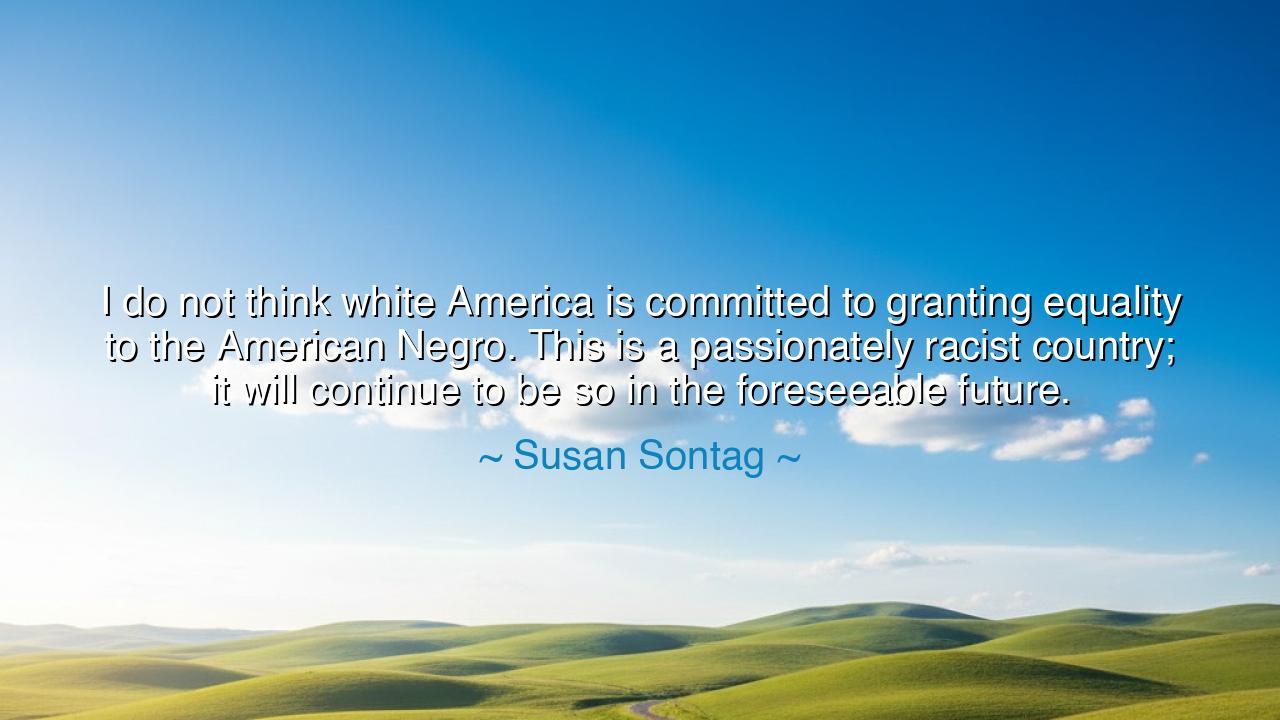
I do not think white America is committed to granting equality to
I do not think white America is committed to granting equality to the American Negro. This is a passionately racist country; it will continue to be so in the foreseeable future.






In the sharp, unflinching words of Susan Sontag, “I do not think white America is committed to granting equality to the American Negro. This is a passionately racist country; it will continue to be so in the foreseeable future,” we are confronted with the harsh reality of racial inequality and the deep-seated prejudices that have been embedded in the fabric of American society. Sontag’s words serve as a call to action, urging us to face the uncomfortable truth about the persistence of racism and the failure to address the historical injustices that continue to plague marginalized communities. To her, the dream of true equality is not a distant future, but something that remains frustratingly out of reach as long as society is unwilling to confront its past and its ongoing inequities.
This claim is not born out of cynicism, but rather a deep understanding of the complexities of social change and cultural inertia. Sontag speaks to a truth that the ancients understood well: that change, especially in the realm of human values and societal structures, is often slow and painful. In ancient Greece, Plato explored the concept of justice and how it relates to the harmony of society. For Plato, a truly just society could only exist when all people, regardless of their status, were treated with equal respect and fairness. Yet, he also acknowledged that society’s imperfections would prevent this ideal from being realized in any meaningful way. In Sontag’s time, and sadly in our own, the dream of equality is often stymied by institutional racism, much as Plato warned that societal flaws often impede the realization of justice.
The lessons of history reinforce Sontag's pessimism. Consider the civil rights movement of the 1960s, when Martin Luther King Jr., in his quest for equality, spoke of his dream of a world where people would be judged by the content of their character and not the color of their skin. King’s dream was noble and visionary, but it faced an entrenched system of racism and a deeply divided society that resisted the changes necessary for true equality. Despite the monumental achievements of the civil rights movement, King’s hopes for a truly equal America were not fully realized in his lifetime. And even today, we continue to see the impact of racial prejudice in the systemic barriers that limit opportunities for marginalized communities. Sontag’s words reflect this bitter truth: the country’s commitment to true racial equality has always been half-hearted, and the battle for justice is far from over.
Similarly, the story of Nelson Mandela in South Africa underscores the enduring struggle for equality in a society built on systemic injustice. Mandela spent 27 years in prison, fighting against the apartheid system, which had institutionalized racism and denied basic human rights to black South Africans. After his release, Mandela's commitment to peace and reconciliation was both revolutionary and profoundly humbling. However, even after the end of apartheid, South Africa continues to grapple with the long-lasting effects of institutional racism and economic inequality. Mandela’s vision for a democratic and equal society was powerful, but the challenges of deeply ingrained prejudice persist, just as Sontag suggested.
Sontag’s statement that white America is not committed to granting equality to the American Negro is a sobering reflection on the failure of society to adequately address the historical and present-day injustices faced by Black Americans. It forces us to confront the uncomfortable reality that, despite the progress of the civil rights era, the ideals of freedom and equality have not been fully realized. We must acknowledge that racism is not just an individual attitude, but a deeply embedded system that continues to affect all levels of society—from education to the criminal justice system, to economic opportunity. This institutionalized racism is what makes the change that Sontag calls for so difficult and why she believes that true equality is still far from our grasp.
The lesson from Sontag’s words is that we must never stop fighting for justice, equality, and the dismantling of racist structures. Though it may seem that the struggle is endless, we must remember that change is a process that requires constant vigilance, resilience, and a willingness to confront uncomfortable truths. It also requires solidarity, both within marginalized communities and with allies who understand that justice is not just a moral imperative but a social necessity for the advancement of society as a whole. As Sontag reminds us, the journey is long and often fraught with setbacks, but we must not falter in our pursuit of a more just and equitable world.
In practical terms, Sontag’s words compel us to examine not only the actions we take individually but the broader systems in which we are complicit. We must educate ourselves and others about the history and ongoing realities of racism. We must amplify the voices of those who have long been silenced and advocate for policies that promote equality and opportunity for all people, regardless of race. Change requires sustained action, and we must be steadfast in our commitment to dismantling the barriers that still exist. It is through collective effort that we can turn the vision of equality into a living, breathing reality, one where the ideals of freedom and justice are not just aspirational, but achievable.






AAdministratorAdministrator
Welcome, honored guests. Please leave a comment, we will respond soon